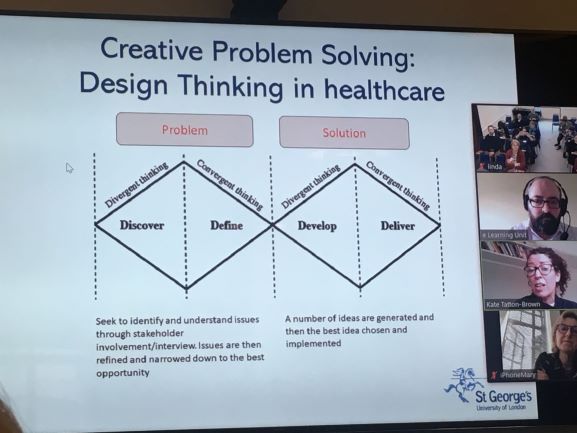I was extremely gratified to see the two parallel sessions I had been most interested in were happening consecutively in the same room!
The first was a 'last minute' choice. I had been speaking before the conference to Vicky Brown (@VickyBrownTLM) about my OU studies and how I was now 5/6 of the way through MAODE. I was telling her that I was already feeling somewhat bereft at the thought of my studies being over. I would probably have to self-fund anything further and I'm not sure that I can prioritise formal studying over the other expenses our family has. Vicky then immediately suggested 'microcredentials' which piqued my interest.
Interestingly this session took place mostly online. All three presenters were either 'self isolating' or unwell so all presented with their slides and a camera on the large screen. This did cause me to consider if we could do something similar at work.

The presenter was Professor Mary Bishop who seems to wear a plethora of hats meaning she is an accountant, an educator, an academic and an assessor! She made a lot of really interesting - and contextually relevant - points:
- Free is great for democratisation and accessibility but it can lead to a perception of low value, or very generic themes (I can see how this happens. I am very on board, ideologically, with open education but I always have a nagging pragmatic concern about where the money comes from. I am sure there must be models which allow accessibility without compromising quality or the perception of quality - see next point.)
- Potential model - learning is free but accreditation isn't. This seems a good idea. It begs the question of what is important - the learning or the badge. In principle the learning must be the most important thing as - if you had to choose one or the other - it's more valuable. However - I am certain that there is a cynical portion of society who would happily get the badge (accreditation, certificate, award) without doing the learning if they found a loophole which allowed such a thing. In this model you can do the course free of charge but would have to pay for the final assessment or even for the official badge.
- Quality Assurance = critical The perception of low value or low quality must be refuted with high quality learning, qualifications and people.
- Good courses are built around a narrative - with a beginning and middle and an end
- Good courses should be 'provocative' (they should provoke interest, engagement)
- Practitioners should accept there is a ceiling for social engagement - whatever you do some people will 'lurk' - watch but not contribute
- Online learning can be very useful for formative assessment even if, for now, summative assessment is more problematic/ difficult
- The Stella Artois principle - good things are reassuringly expensive. Low cost or free resources are often low quality but even more often perceived to be
- A way in is 'microcredentialling' - small stakes, low risk
- The Royal Colleges (medical bodies) are beginning accept short activities / online courses and assign CPD approval